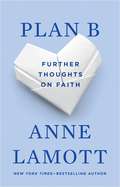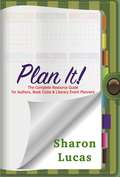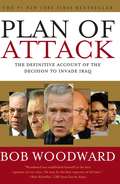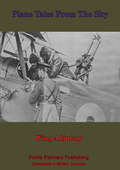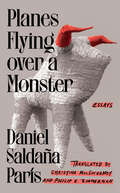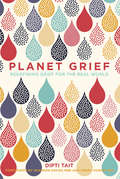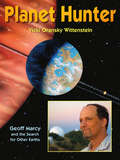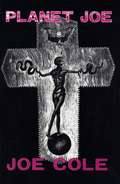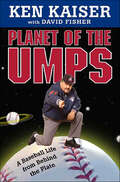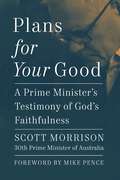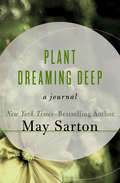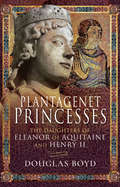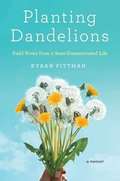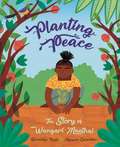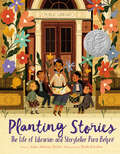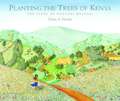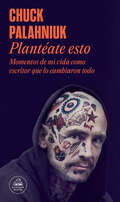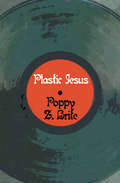- Table View
- List View
Plan B: Further Thoughts on Faith
by Anne LamottWith the trademark wisdom, humor, and honesty that made Anne Lamott's book on faith, Traveling Mercies, a runaway bestseller, Plan B: Further Thoughts on Faith is a spiritual antidote to anxiety and despair in increasingly fraught times. The world is a more dangerous place than it was when Lamott's Traveling Mercies was published five years ago. Terrorism and war have become the new normal; environmental devastation looms even closer. And there are personal demands on Lamott's faith as well: turning fifty; her mother's Alzheimer's; her son's adolescence; and the passing of friends and time. Fortunately for those of us who are anxious and scared about the state of the world, whose parents are also aging and dying, whose children are growing harder to recognize as they become teenagers, Plan B offers hope in the midst of despair. It shares with us Lamott's ability to comfort, and to make us laugh despite the grim realities. Anne Lamott is one of our most beloved writers, and Plan B is a book more necessary now than ever. It will prove to be further evidence that, as The Christian Science Monitor has written, "Everybody loves Anne Lamott. "
Plan It!
by Sharon LucasThe Perfect Planning Guide for Book clubs! The African American author is often overworked, overlooked and underrated. That coupled with the closing of many bookstores, which had long been the gathering place for these authors, and the emergence of E-readers, has changed the way in which our writers and readers meet and converse. Though book clubs have long been a cornerstone of the African American community, at no other time in our history has it been more important for readers to support African American authors and to help fill the void left by the closing of our brick and mortar stores. A well organized book club can be invaluable in spreading the news about great books and talented authors and what better way to achieve that than bringing these two groups together in a well-planned and executed literary event. Plan It! The Complete Resource Guide for Authors, Book Clubs, & Literary Event Planners provides anyone who wants to start a book club with an all-in-one guide to planning book club and literary events. This required companion includes forms, checklists, and tips to start and manage book club meetings, author visits, and planning full-scale literary events. Not just for book clubs, though, this handy guide also provides authors and event planners with the information they need to make any event a resounding success.
Plan of Attack (Bush at War, Part II)
by Bob WoodwardPlan of Attack is the definitive account of how and why President George W. Bush, his war council, and allies launched a preemptive attack to topple Saddam Hussein and occupy Iraq. Bob Woodward's latest landmark account of Washington decision making provides an original, authoritative narrative of behind-the-scenes maneuvering over two years, examining the causes and consequences of the most controversial war since Vietnam. Based on interviews with 75 key participants and more than three and a half hours of exclusive interviews with President Bush, Plan of Attack is part presidential history charting the decisions made during 16 critical months; part military history revealing precise details and the evolution of the Top Secret war planning under the restricted codeword Polo Step; and part a harrowing spy story as the CIA dispatches a covert paramilitary team into northern Iraq six months before the start of the war. This team recruited 87 Iraqi spies designated with the cryptonym DB/ROCKSTARS, one of whom turned over the personnel files of all 6,000 men in Saddam Hussein's personal security organization. What emerges are astonishingly intimate portraits: President Bush in war cabinet meetings in the White House Situation Room and the Oval Office, and in private conversation; Dick Cheney, the focused and driven vice president; Colin Powell, the conflicted and cautious secretary of state; Donald Rumsfeld, the controlling war technocrat; George Tenet, the activist CIA director; Tommy Franks, the profane and demanding general; Condoleezza Rice, the ever-present referee and national security adviser; Karl Rove, the hands-on political strategist; other key members of the White House staff and congressional leadership; and foreign leaders ranging from British Prime Minister Blair to Russian President Putin. Plan of Attack provides new details on the intelligence assessments of Iraq's alleged weapons of mass destruction and the planning for the war's aftermath.
Plandemic: Fear Is the Virus. Truth Is the Cure.
by Mikki WillisThe incredible true story of the most banned documentary in history. Researching the controversy arising after the release of the viral phenomenon known as Plandemic, the most seen and censored documentary in history, an investigative journalist sets out to disprove and debunk claims made throughout the film. Instead, the journalist opens a Pandora&’s box to witness firsthand an underworld of corruption, lies, and the darkest of unsolved mysteries. The result? A fascinating behind-the-scenes account about the making of Plandemic and Plandemic: Indoctornation; an exposé of the truth behind the origins of COVID-19; an alarming examination of individuals, such as Dr. Anthony Fauci and Bill Gates, and organizations like the CDC, NIH, WHO, and Bill & Melinda Gates Foundation, among others, driving the global vaccination agenda; and a look at the tech giant and mainstream media forces doing their utmost to silence and suppress the veracity of these findings. Investigative filmmaker Mikki Willis focuses his unflinching lens on two key subjects: virologist Dr. Judy Mikovits, who speaks frankly about the machinations for control and profit corrupting individuals and institutions tasked with overseeing public health; and Dr. David E. Martin, whose research and shocking data corroborate allegations of conflicts of interest. The US media and fact checkers condemned the two documentaries as &“dangerous conspiracy theory.&” Today, the two-part bombshell is being hailed globally for warning the world of the crimes against humanity that are just now being uncovered. From the death of his brother and mother due to bad medicine, to his awakening at Ground Zero on 9/11, Mikki Willis describes in detail the incredible life experiences that led him to risk his career and safety to create the Plandemic series.
Plane Tales From The Sky
by Wing Adjutant"Air Combat over the trenches by those who foughtThe first-hand accounts of the experiences of men in time of war always make fascinating reading. Their stories are, of course, always as varied as the individuals concerned and the eras to which they belonged, whether they were soldiers, sailors or airmen, the branch of their service, their nationalities, the conflict in which they were participants and in which theatre they fought. This is what makes military history so fascinating. Sometimes many men report a common experience that abided for decades. Occasionally we hear, across time, the voices of a few notable men who fought their own war in their own special way and once their time had past history would never know their like again. That is especially true of the pilots of the First World war. The machinery of flight was a new technology. The aircraft were raw, basic, flimsy and unproven machines and both they and the brave men who piloted them were fighting their first conflict while learning and evolving their skills and equipment, quite literally, as they fought and died. The dogfight days of the early biplanes, triplanes and early mono winged fighters would be short, but their images together with those of the iconic airships which they ultimately destroyed will remain indelibly imprinted on the history of conflict and the development of man's mastery of the air. Heroes to a man, these trailblazers were almost always young, carefree, well-educated and modest young men full of the joy of living and commitment to their aircraft and to flying."-Leonaur Print VersionAuthor -- Wing Adjutant (Pseud.)Text taken, whole and complete, from the edition published in London, New York, Cassell and company, ltd., 1918.Original Page Count - 182 pages
Planes Flying over a Monster: Essays
by Daniel Saldaña ParísFrom one of Mexico&’s most exciting young writers, a cosmopolitan and candid essay collection exploring life in cities across the world and reflecting on the transformative importance of literature in understanding ourselvesIn ten intimate essays, Daniel Saldaña París explores the cities he has lived in, each one home to a new iteration of himself. In Mexico City he&’s a young poet eager to prove himself. In Montreal—an opioid addict desperate for relief. In Madrid—a lonely student seeking pleasure in grotesque extremes. These now diverging, now coalescing selves raise questions: Where can we find authenticity? How do we construct the stories that define us? What if our formative memories are closer to fiction than truth? Saldaña París turns to literature and film, poetry and philosophy for answers. The result is a hybrid of memoir and criticism, "a sensory work, full of soundscapes, filth, planes, closed spaces, open vastness" (El País).
Planet Claire, Suite for Cello and Sad-Eyed Lovers: A Memoir
by Jeff PorterThe second installment in Ann Hood’s Gracie Belle imprint challenges the traditional solemnity that characterizes nonfiction books of grief, loss, and sorrow.“Few readers will fail to be gripped by this tragically common story about death and what comes after for those left behind . . . A haunting and thought-provoking consideration of death and ‘how utterly it rips apart our lives.'” —Kirkus Reviews, Starred ReviewPlanet Claire is the story of the untimely death of the author’s wife and his candid account of the following year of madness and grief. As his life unravels, Porter analyzes his sadness with growing interest. He talks to Claire as if to evoke a presence, to mark a space for memory. He reports on his daily walks and shares observations of life’s sadness, while reminiscing about various moments in their life together. Like Orpheus, the author searches for a lost love, and what he finds is not the dog of doom but flashes of an intimate symmetry that brighten the darkest places of sorrow.The second title from Ann Hood’s Gracie Belle imprint, Planet Claire takes readers on a journey of sorrow that recalls memorable works by C.S. Lewis (A Grief Observed), Joan Didion (The Year of Magical Thinking), and Julian Barnes (Levels of Life). Porter’s memoir, however, is also playful, quirky, and self-ironic in a way that challenges the genre’s traditional solemnity. Like the novel Grief Is the Thing with Feathers by Max Porter, this is an unpredictably funny account of heartbreak, as if to say there’s something about the magnitude of loss that troubles even earnestness.
Planet Grief: Redefining Grief for the Real World
by Penny Power Dipti Tait Sharron DaviesWe all grieve. From the moment we are born into this cold, loud, bright world, we experience change and loss that can often threaten to overwhelm us, but – when managed well – can help mould us into our strongest, most powerful selves.Grief is not only about death: it is part of our everyday lives. We are all grieving something. We grieve when our life changes – when meaningful relationships end, when we move house, change schools or jobs, and when our sense of identity and reality are under threat. We also grieve on a larger level – for a lost way of life and for our planet, particularly in these times of climate crisis, pandemic, fast-moving technology, misinformation and societal division. Grief can even be found in joy and is one of the most universal shared emotions, connecting people across the world in an act of love.In this surprisingly uplifting book, acclaimed grief therapist Dipti Tait draws on her own professional and personal experiences, her clients’ stories and the neuroscience behind our emotions to redefine grief for our fast-paced lives and this sometimes alarming yet wonderful world we live in.
Planet Hunter: Geoff Marcy and the Search for Other Earths
by Vicki O. WittensteinHe has discovered more planets than anyone in history. In this inspiring true story, winner of the American Institute of Physics Award, Geoff Marcy's love of space helped him overcome struggles in his studies until finally he became an astronomer. <P><P> But he was not on track to make major discoveries. Eventually, he went back to the questions that thrilled him as a boy: Are we alone? Do Earth-like planets orbit the stars in the night sky? It would not be easy to find a planet outside our solar system. Others had tried and failed. But Marcy never gave up. Since 1995, he and his colleagues have discovered nearly half of the 380 known "extrasolar" planets. Stunning paintings transport the reader to the exotic worlds that he and others have found.
Planet Joe
by Joe ColeLife on the road as seen through the eyes of Black Flag/Rollins Band roadie and Rollins confidante, Joe Cole. Tour journal documenting the final Black Flag tour and first Rollins Band tour.
Planet of the Blind
by Stephen Kuusisto<P> "The world is a surreal pageant," writes Stephen Kuusisto. "Ahead of me the shapes and colors suggest the sails of Tristan's ship or an elephant's ear floating in air, though in reality it is a middle-aged man in a London Fog rain coat which billows behind him in the April wind." <P>So begins Kuusisto's memoir, Planet of the Blind, a journey through the kaleidoscope geography of the partially-sighted, where everyday encounters become revelations, struggles, or simple triumphs. Not fully blind, not fully sighted, the author lives in what he describes as "the customs-house of the blind", a midway point between vision and blindness that makes possible his unique perception of the world. In this singular memoir, Kuusisto charts the years of a childhood spent behind bottle-lens glasses trying to pass as a normal boy, the depression that brought him from obesity to anorexia, the struggle through high school, college, first love, and sex. Ridiculed by his classmates, his parents in denial, here is the story of a man caught in a perilous world with no one to trust--until a devastating accident forces him to accept his own disability and place his confidence in the one relationship that can reconnect him to the world--the relationship with his guide dog, a golden Labrador retriever named Corky. With Corky at his side, Kuusisto is again awakened to his abilities, his voice as a writer and his own particular place in the world around him. <P> Written with all the emotional precision of poetry, Kuusisto's evocative memoir explores the painful irony of a visually sensitive individual--in love with reading, painting, and the everyday images of the natural world--faced with his gradual descent into blindness. Folded into his own experience is the rich folklore the phenomenon of blindness has inspired throughout history and legend.
Planet of the Umps: A Baseball Life from Behind the Plate
by David Fisher Ken KaiserFor twenty-five years, Ken Kaiser was the most colorful umpire in the major leagues. Planet of the Umps is his sidesplitting tale of life behind the plate."Two things nobody wants to grow up to be are an umpire and broke. Thanks to my career in baseball, I got both."After calling balls, strikes, and outs for thirty-six baseball seasons and more than three thousand major-league games, umpire Ken Kaiser finally called it a career. From the first day he hit a minor-league catcher with a pool table to the fateful day baseball called him out on a strike, Kaiser was one of the game's most popular and colorful characters. And in this autobiography--written with the coauthor of Ron Luciano's classic bestseller The Umpire Strikes Back--Kaiser brings to life his wild adventures from the pro-wrestling arena to the baseball diamond.This is the hysterically true story of four decades of baseball as lived and loved on the playing field, from Ted Williams and Billy Martin to Derek Jeter and Mark McGwire, from one-eyed umpires to space-age technology. As he did throughout his long and sometimes controversial career, the larger-than-his-chest-protector Kaiser calls 'em as he saw 'em.
Planetwalker
by John FrancisFrancis' journey began in 1971 when after witnessing an oil spill in San Francisco bay he gave up using motorized transport, and tired of arguing with his friends about whether he was making a difference or not, he gave up speaking. In 1983, in an effort to raise environmental awareness, he set off on foot and in silence across the US and continued to walk for the next 22 years, earning undergraduate and Masters degrees in science and environmental studies and a Ph. D. in land resources along the way. Here he presents the story of his pilgrimage which covered ground from the Pacific to Atlantic coasts, the South American continent from tip to tip, Cuba, and both Alaska and Antarctica. His pen and ink sketches illustrate the margins of practically every page. Annotation ©2009 Book News, Inc. , Portland, OR (booknews. com)
Planned Conservation of 20th-century Architecture: Research in Italy and Brazil (SpringerBriefs in Applied Sciences and Technology)
by Davide Del Curto Simona SalvoThis book deals with the planned conservation of modern architecture and proposes a comparative discussion between eight research programs recently completed in Italy and Brazil as part of the “Keeping It Modern” program by means of which the Getty Foundation supported the drafting of conservation management planning for major architectural masterpieces of the twentieth-century worldwide, between 2014 and 2020. The scientific results of this program are maturing and also resulting in publications promoted by universities and research centers involved by the Getty Foundation. Within this framework of initiatives, we dedicate this book to the comparison among research projects carried out in Italy and Brazil, starting from the distinctive characteristics that modern architecture has gained in the two countries and evaluating the impact that the Conservation Management Plans on the cultural scenario of each country and on the corresponding protection systems. We asked the co-authors to reconsider the research experience faced within the KIM program, overcoming their description, and proposed to describe its specific reflection on the role that management plans play for twentieth-century architecture and on how the outcomes of this experience have contributed to the debate on the protection of contemporary architecture. Finally, the book presents many transversal topics and highlights numerous similarities in approach between the two countries, but also profound differences in the way of understanding conservation of twentieth-century architectural heritage.
Plans For Your Good: A Prime Minister's Testimony of God's Faithfulness
by Scott MorrisonScott Morrison, Australia's 30th Prime Minister (2018-2022), offers a unique insider's account of a Christian who was open about his faith and operated at the top level of politics for more than a decade. During one of the toughest periods since the second world war, covering drought, wildfires, a global pandemic and recession, he chronicles God's faithfulness throughout, win or lose, public criticism or public success.Less political memoir and more pastoral encouragement, Morrison is passionate about encouraging others to discover how they can access and see the many blessings of God in their own lives, no matter their circumstances, drawing on Jeremiah 29:11, that God's plans are for our good and not our harm, to give us a future and a hope. In each section Morrison asks the questions all of us are looking to find answers to:Who am I? Discovering your purpose.How should I live? Finding your pathway.What should I hope for? Embracing your future. Full of fascinating insights into the handling of some of the most significant global events and issues of our time Morrison's honest, vulnerable and reflective answers offers a unique lens to better understand your relationship with God and the blessing that can flow from such a relationship.Alongside an account of high-level politics in a new media age where cancel culture, identity politics and deep secularization is taking hold across so many western societies, creating a truly post Christian west, Morrison testifies to the faithful love and blessings of God.
Plant Dreaming Deep: A Journal
by May SartonThe author&’s tribute to the 18th-century New England farmhouse she called home: &“[A] tender and often poignant book by a woman of many insights&” (The New York Times Book Review). In Plant Dreaming Deep, Sarton shares an intensely personal account of transforming a house into a home. She begins with an introduction to the enchanting village of Nelson, where she first meets her house. Sarton finds she must &“dream the house alive&” inside herself before taking the major step of signing the deed. She paints the walls white in order to catch the light and searches for the precise shade of yellow for the kitchen floor. She discovers peace and beauty in solitude, whether she is toiling in the garden or writing at her desk. This is a loving, beautifully crafted memoir illuminated by themes of friendship, love, nature, and the struggles of the creative life. This ebook features an extended biography of May Sarton.
Plant Dreaming Deep: A Journal
by May SartonThe author&’s tribute to the 18th-century New England farmhouse she called home: &“[A] tender and often poignant book by a woman of many insights&” (The New York Times Book Review). In Plant Dreaming Deep, Sarton shares an intensely personal account of transforming a house into a home. She begins with an introduction to the enchanting village of Nelson, where she first meets her house. Sarton finds she must &“dream the house alive&” inside herself before taking the major step of signing the deed. She paints the walls white in order to catch the light and searches for the precise shade of yellow for the kitchen floor. She discovers peace and beauty in solitude, whether she is toiling in the garden or writing at her desk. This is a loving, beautifully crafted memoir illuminated by themes of friendship, love, nature, and the struggles of the creative life. This ebook features an extended biography of May Sarton.
Plantagenet Princesses: The Daughters of Eleanor of Aquitaine and Henry II
by Douglas BoydA look at the royal women of twelfth-century England—from the empowered to the imprisoned—and their roles in the ruling dynasty.Eleanor of Aquitaine and her second husband, Henry II, are commonly considered medieval figures, but their era was really the violent transition from the Dark Ages, when countries’ borders were defined with fire and sword. Henry grabbed the English throne thanks largely to Eleanor’s dowry, because she owned one third of France. But their less famous daughters also lived extraordinary lives. If princes fought for their succession to crowns, the princesses were traded—usually by their mothers—to strangers to gain political power without the usual accompanying bloodshed. Years before what would today be marriageable age, royal girls were dispatched to countries whose speech was unknown to them, and there became the property of unknown men—their duty the bearing of sons to continue a dynasty and daughters who would be traded in their turn. Some became literal prisoners of their spouses; others outwitted would-be rapists and the Church to seize the reins of power when their husbands died. Eleanor’s daughters Marie and Alix were abandoned in Paris when she divorced Louis VII of France. By Henry II, she bore Matilda, Aliénor, and Joanna. Between them, these extraordinary women and their daughters knew the extremes of power and pain. Joanna was imprisoned by William II of Sicily and treated worse by her brutal second husband in Toulouse. Eleanor may have been libeled as a whore, but Aliénor’s descendants include two saints, Louis of France and Fernando of Spain. And then there were the illegitimate daughters, whose lives read like novels. This fascinating volume tells their stories.
Planting Dandelions
by Kyran Pittman"[Pittman's] tales of modern motherhood are fearless and addictive" (People, four stars) A regular contributor to Good Housekeeping, Kyran Pittman has won the hearts of readers with her keen eye, wicked tongue, and deep affection for the vagaries of family life. In these eighteen linked essays, she covers the first twelve years of starting a family, writing candidly and hilariously about things like learning to maintain a marriage over time, the challenges of sex after childbirth, saying goodbye to her younger self and embracing the still attractive forty- four-year-old version, and trying to "recession proof " her family by downsizing to avoid foreclosure. .
Planting Peace: The Story of Wangari Maathai
by Gwendolyn HooksThis is the inspiring story of Wangari Maathai, women's rights activist and one of the first environmental warriors. Overcoming great obstacles, Wangari began the Green Belt Movement in Kenya in the 1960s, which focused on planting trees, environmental conservation and women's rights. She inspired thousands across Africa to plant 30 million trees in 30 years, saving many from hunger and poverty. Her remarkable story of courage and determination shows how just one person can change the world.The story shows children how desertification works: how land is eroded and degraded when trees aren't there to hold the soil in place so it's not taken away by winds and heavy rain. It explains how all living things are dependent on each other and if trees are taken away, then you not only lessen the fertility of the soil, but you lose the animals that live there and then the animals that rely on those animals for food and so on.As well as explaining important green issues, the book also talks about Wangari's fight for human rights and shows how important it is to stand up for what you believe.The gripping narrative non-fiction text by Gwendolyn Hooks, winner of the NAACP Image Award for Outstanding Literary Work for Children, hooks readers from the start. Vibrant illustrations from print-maker Margaux Carpentier, one of the featured artists in Taschen's The Illustrator: 100 Best from around the World, vividly evoke Wangari's amazing life story.The consultant, Dr Jane Irungu, grew up in Kenya, but is now a Professor at the University of Oklahoma. She was inspired by Wangari when she was growing up and went on to get a PhD just as Wangari did. 'Carpentier's saturated geometric illustrations emphasize the bold impact of Maathai's actions', Publishers Weekly, May 2021
Planting Stories: The Life of Librarian and Storyteller Pura Belpré
by Anika Aldamuy DeniseRECIPIENT OF THE PURA BELPRÉ HONOR * A Today Show's Best Kids' Books of 2019 * Indie Next List Pick * Junior Library Guild Selection * “An appealing tribute and successful remedy to the lack of titles about the groundbreaking librarian...a must-have for all libraries.” —School Library Journal (starred review)An inspiring picture book biography of storyteller, puppeteer, and New York City’s first Puerto Rican librarian, who championed bilingual literature.When she came to America in 1921, Pura Belpré carried the cuentos folklóricos of her Puerto Rican homeland. Finding a new home at the New York Public Library as a bilingual assistant, she turned her popular retellings into libros and spread story seeds across the land. Today, these seeds have grown into a lush landscape as generations of children and storytellers continue to share her tales and celebrate Pura’s legacy.Brought to colorful life by Paola Escobar’s elegant and exuberant illustrations and Anika Aldamuy Denise’s lyrical text, this gorgeous book is perfect for the pioneers in your life.Informative backmatter and suggested further reading included.A Spanish-language edition, Sembrando historias: Pura Belpré: bibliotecaria y narradora de cuentos, is also available.“Anika Aldamuy Denise’s intimate telling captures the magical, folk-tale feeling of Belpré’s own stories. Her lyrical text, sprinkled like fairy dust with Spanish words, begs to be read aloud, while Paola Escobar’s stylishly detailed and warmly expressive illustrations capture the joy of sharing stories.” —New York Times Book Review
Planting the Trees of Kenya: The Story of Wangari Maathai
by Claire A. NivolaWangari Maathai, winner of the 2004 Nobel Peace Prize and founder of the Green Belt Movement, grew up in the highlands of Kenya, where fig trees cloaked the hills, fish filled the streams, and the people tended their bountiful gardens. But over many years, as more and more land was cleared, Kenya was transformed. When Wangari returned home from college in America, she found the village gardens dry, the people malnourished, and the trees gone. How could she alone bring back the trees and restore the gardens and the people? Bill McKibben, author of The End of Nature, says: “Wangari Maathai’s epic story has never been told better—-everyone who reads this book will want to plant a tree!” With glowing watercolor illustrations and lyrical prose, Claire Nivola tells the remarkable story of one woman’s effort to change the fate of her land by teaching many to care for it. An author’s note provides further information about Wangari Maathai and the Green Belt Movement. In keeping with the theme of the story, the book is printed on recycled paper.
Planting the Trees of Kenya: The Story of Wangari Maathai
by Claire A. NivolaWith glowing watercolor illustrations and lyrical prose, Claire Nivola tells the remarkable story of one woman's effort to change the fate of her land by teaching many to care for it. An author's note provides further information about Wangari Maathai and the Green Belt Movement. In keeping with the theme of the story, the book is printed on recycled paper.
Plantéate esto: Momentos de mi vida como escritor que lo cambiaron todo
by Chuck PalahniukEl libro más personal del célebre autor de El club de la lucha: una guía indispensable y original para aspirantes a escritores. Tras más de dos décadas dedicado a la escritura, el aclamado autor de El club de la lucha ha decidido compartir su sabiduría y sus años de experiencia en el arte de contar historias. Palahniuk revela los conocimientos que él mismo ha ido acumulando con los años, gracias a su gran capacidad de observación, a los talleres literarios en los que se formó, y a los escritores y maestros que, como Tom Spanbauer, influyeron en su obra. Palahniuk nos regala una sólida guía práctica para construir y desarrollar una novela (con propuestas únicas que no aparecen en los manuales de escritura), y nos habla de los tipos de personajes que conforman una trama, de la escritura como terapia o de cómo implicar al lector para que empatice con la narración. Las ideas que plantea incluyen desde consejos prácticos y ejemplos de obras clásicas y de sus propios libros, hasta un sinfín de anécdotas y recuerdos de su vida como escritor y de sus años de tours literarios por el mundo. Esta obra, destinada a convertirse en un referente de los libros sobre la escritura, es una lúcida, sensible y experta carta de amor al oficio de escritor. La crítica ha dicho:«Con reminiscencias a Mientras escribo de Stephen King, que es tan entretenido como didáctico, [Plantéate esto] es un recurso indispensable para escritoresPublishers Weekly «Palahniuk revela una humildad sorprendente con ideas frescas y accesibles. Sus fans apreciarán el análisis de su propio trabajo —especialmente con El club de la lucha (1996)—, sus homenajes a amigos y antecesores, y cómo imparte sabiduría de una forma amable y alentadora en su particular tono coloquial».Booklist «Un maestro cargado de sabiduría. [Palahniuk] ofrece consejos muy detallados y sumamente prácticos».Kirkus Reviews «Un libro esclarecedor».Dallas Morning News «Consejos prácticos y veraces para aspirantes a escritores».USA Today «Una de las imaginaciones más febriles de las letras estadounidenses».The Washington Post «Palahniuk no escribe para turistas. Escribe para devotos incondicionales que se sienten atraídos por la imaginación salvaje y furiosa que desprende, y por ese sobresaliente humor con el que rompe tabúes».Janet Maslin, The New York Times
Plastic Jesus
by Poppy Z. BriteThe 1960's brought Seth and Payton all they'd fantasized about—perfect friendships, a successful four-man band, and most importantly, each other. Together they embarked on a tour that brought them stimulating highs and shattering lows, and they prospered and suffered in one another's arms. The two men carried each other and carried a group that created both a history and a future for rock. But at some point their music blurred with the news of their love and the world was faced with the choice to embrace its heroes or revert back to its deep-rooted prejudices.
